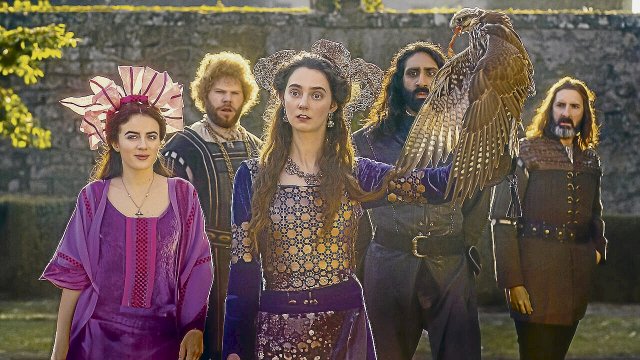There probably wasn’t really that much emancipation in the 14th century.
Photo: Netflix
Escapism is not only distracting but often also therapeutic. Anyone who wants to escape everyday life through football, lifestyle, Katie Fforde will ultimately be guided entertainingly by RTL, Instagram and ZDF onto branches of unreserved denial of reality that make the misery out there invisible. Very healing.
Sometimes the escapism offering also leads its audience along unhealthy escapism routes that are more like highways to hell. Or, as in the tragicomic Netflix eight-parter “The Decameron,” they lead into the dark heart of the most devastating pandemic of all time: the “Black Death” of the plague.
In the middle of the 14th century, a time as godly as it was godless, the bacterium Yersinia pestis killed around 25 million people of all classes and backgrounds – a quarter of the European population and thousands upon thousands of them in Florence, the city of Giovanni Boccaccio. The poet wrote “Il Decamerone” about this in 1349, in German: Ten Days. That’s why this work also includes ten novellas with ten scenes each. Boccaccio paints hell on earth with powerful imagery, but provides it with an emergency exit.
In the series, the fictional Prince Leonardo invited aristocrat friends to his chic country estate near Florence. While the corpses are piling up there, the group of privileged people can expect a stately feast in luxury – theoretically. In practice, the epidemic has long since reached the feudal refuge. Not only the landlord, but also a large number of his employees fell victim to it. Only Major Domus Sirisco (Tony Hale) and cook Stratilia (Leila Farzad) take care of their physical well-being.
The plague is not the only problem facing this illustrious group of nobles who are escaping from reality. Because the more they close their eyes to the sick reality, the more clearly they see their own abysses. In 1975, none other than Pier Paolo Pasolini had already shown what these consist of – in his scandalous work “The 120 Days of Sodom”, when he moved the action to the time of Italian late fascism: to the “Republic of Salò”, in which Mussolini In 1943 he retreated to northern Italy under the protection of the Wehrmacht after his own people overthrew him in Rome. Pasolini depicts a morbid bourgeoisie that indulges in sexual exploitation and torture, which led to the banning of the film in several countries, which was also Pasolini’s last.
Two or three emancipation movements and three or four porn portals later, five or six explicit sex scenes are no longer enough for broadcast bans. But director Michael Uppendahl also turns the scripts of his main author Kathleen Jordan into a work that plays with the voyeurism of the viewer. Unlike Boccaccio and Pasolini, they caricature the characters as badasses in a Dionysian grotesque and usually locate them in the present rather than in the Middle Ages – and not just because of the original language, English.
Leonardo’s fiancée Pampinea (Zosia Mamet) and housemaid Misia (Saoirse-Monica Jackson), the pious Neifile (Lou Gala) and her chaste husband Panfilo (Karan Gill), the hypochondriac Tindaro (Douggie McMeekin) and his sexy personal doctor Dioneo (Aman Chadha- Patel) or the maid Licisca (Tanya Reynolds), who poses as her mistress Filomena (Jessica Plummer) – they could all just as well come from a crazy historical comedy by Mel Brooks.
Luckily, Uppendahl’s humor is more like Monty Python. And he also uses his series directing experience from “Mad Men” or “Fargo” to aestheticize sexuality and violence in such a way that both appear quite drastic, but rarely gain interpretive sovereignty over the narrative. In fact, despite all the eroticism that has long been part of good television thanks to series like “Rome” or “Game of Thrones” to “Bridgerton,” it is also about the society around us.
As ridiculous as the characters and settings, dialogues and equipment seem, they at least incidentally comment on the bigotry of an era in which the nobility, clergy and state demanded morality and decency from the people, but personally always acted without morality. The way Uppendahl packs this mendacity into sometimes vulgar, often brutal, but in the end mostly ridiculous images is deeply revealing and therefore often uproariously funny. Whether you can laugh at the deadliest pandemic of all time and its victims is of secondary importance, as long as the series primarily makes fun of stronger people – and it does that all the time.
However, the series leaves no character unscathed – no matter how relevant to the plot they are. Just this much: a sequel is unlikely. It’s a shame actually. The ten days of “The Decameron” are not only quite amusing, they also give the term escapism a whole new meaning.
Running on Netflix.
Subscribe to the “nd”

Being left is complicated.
We keep track!
With our digital promotional subscription you can read all issues of »nd« digitally (nd.App or nd.Epaper) for little money at home or on the go.
Subscribe now!
judi bola sbobet88 judi bola sbobet88
